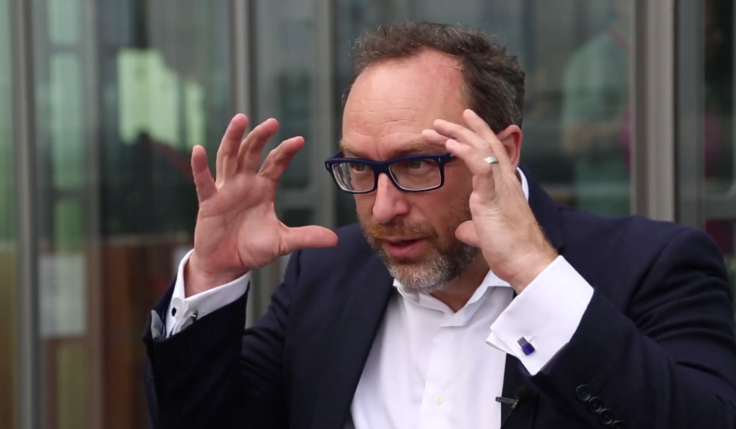Jimmy Wales: Google Should Not Be 'The Arbiter of History'

The founder of Wikipedia, Jimmy Wales, believes the European Parliament needs to act quickly to change the law regarding the high-profile right to be forgotten ruling, which could see Google become "the arbiter of history".
Wales spoke to IBTimes UK this week at Google's UK headquarters in central London where he was one of the judges at the company's Global Impact Awards.
Wales has publicly ridiculed the European Court of Justice ruling previously, and said this week that no matter what you view on privacy, the current situation is simply untenable.
"I think there are a lot of people there who realise that whereever you stand on privacy and freedom of speech, we almost certainly don't want to organise society so that Google is forced to be the arbiter of history."
Today [1 August] marks 81 days since individuals gained the right to request the removal from search results of online content related to them.
So far Google says it has received over 90,000 removal requests. Of these Google has complied with 50,000, rejected about 27,000 while seeking further information in another 13,000 cases.
Unworkable, ambiguous, unhelpful
Earlier this week the House of Lords published a damning report on the ruling, claiming that it was variously "unworkable", "impossible", "unhelpful", "vague" and "ambiguous".
Wales couldn't agree more with the report, which he says was "well thought out" and reflected his views "almost perfectly".
"I agree with [the report] 100%. I though it was brilliant. I think it is a little bit depressing in a way that the House of Commons - whipped to within an inch of their lives - passed emergency legislation just like that [the Data Retention and Investigatory Powers Bill (Drip)] and it takes the unelected House of Lords to stand up for civilians' rights."
While the European Court of Justice ruling impacts all search engines with a base in Europe, it is Google which has come under the most scrutiny as it has a 90% share of the search market.
Criticism
Wales has said Wikipedia is not affected by the ruling as it doesn't have any servers in Europe, but he is at the centre of the debate, in part due to his outspoken criticism but also his inclusion on an independent advisory board, established by Google, to try and unpick the ruling and its implications.
I think it is a little bit depressing in a way that it takes the unelected House of Lords to stand up for civilians' rights.
The board has been convened by Google and features a number of Google people - including executive chairman Eric Schmidt - but Wales is at pains to point out that this is an independent group and everyone on the board is giving of their time voluntarily.
The board's remit is to "come up with a set of recommendations for - philosophically - how should Google deal with these issues, but also a set of recommendations how should the law be changed to be more reasonable."
The group held its first meeting at Google's UK headquarters in central London last week.
Useful
The gathering was more of an introductory meeting than anything else, Wales said, but it also went through technical discussions on how a search engine works (which Wales points out he didn't need) to presentations from an outside lawyer about how European law works.
The next step will be to hold six public hearings with experts to "give us input so that we can compile a report that is hopefully useful."
It remains to be seen just how useful the board and its report will be, as any change in the way the law is currently interpreted will require the European Parliament to act.
The ECJ ruling, Wales says, came as a surprise and is based on legislation which existed three years before Google did. "The definition in it is very unclear and clearly need updating. And again, we really need to have a really thoughtful debate about...how do we strike the right balance and it is not just a spectrum it is about getting all the details right."
"I think it will make a difference"
However Wales is reservedly optimistic that the EU will make not the board's report is published:
"I think [the report] will make a difference to the European parliament who have quite often come down on a reasonably correct side on digital issues."
Referencing the Drip legislation which was rushed through the UK parliament recently, Wales said that it gives society a "real opportunity" to have "a really serious public debate about the limits of the surveillance state and what kind of society we really want to be, because I think it is so important."
Outdated legislation enacted before the internet became a mainstream technology is one of the biggest problems preventing dealing adequately and correctly with privacy online. The internet does not belong to one country or another, it does not have borders.
Clearly broken
Wales says, however, that "even if the internet somehow had borders, that doesn't change the fact that censoring a newspaper is a human rights violation.That is just wrong and it doesn't matter what culture you are in."
Asked when he thinks a change in this "bizarre" law might come about, Wales says he is unsure, but hopes it happens fast.
"I don't know [when it will happen]. The sooner the better I hope. I do think it is something that is so clearly broken [that] no matter what your ultimate position is on privacy, this solution is just clearly the wrong one that the European parliament needs to act quickly to update the law to make it clear."
© Copyright IBTimes 2024. All rights reserved.






